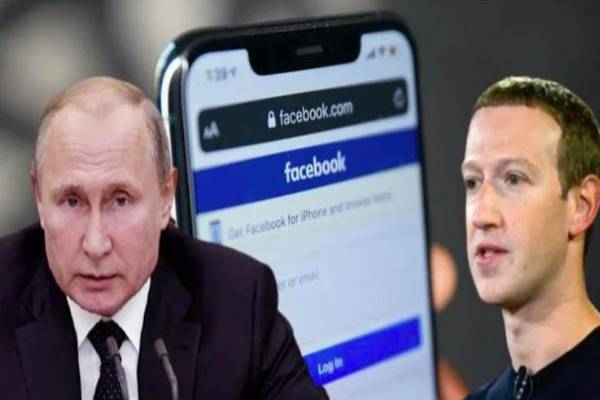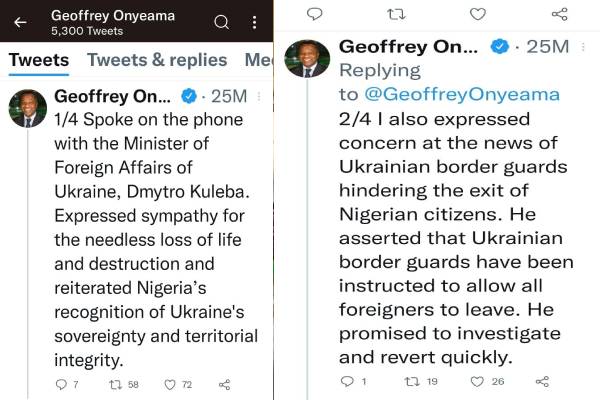As Moscow’s invasion of neighboring Ukraine reaches the streets of Kyiv, Facebook says it has limited the capacity of Russian official media to earn money on the social media platform.
“We are now prohibiting Russian state media from running ads or monetising on our platform anywhere in the world,” Nathaniel Gleicher, the social media giant’s security policy head, said on Twitter on Friday.
He added that Facebook would “continue to apply labels to additional Russian state media”.
The move comes just hours after Moscow announced it was restricting Facebook access due to a fact-checking debate and the invasion of Ukraine
After defying authorities’ orders to stop using fact checkers and content warning labels on its platforms, Facebook’s parent company, Meta, warned earlier on Friday that Russia will impose limits on its services.
Social media platforms have become one of the front lines in Russia’s invasion of Ukraine, providing often inaccurate information as well as real-time monitoring of a rapidly developing conflict that has marked Europe’s worst geopolitical crisis in decades.
Facebook also launched a function in Ukraine on Wednesday that allows users to lock their profiles for added security, similar to what the corporation did after the Taliban took control of Afghanistan last year.
Facebook has established a special operations center to monitor the situation in Ukraine, according to Gleicher, “in reaction to the escalating military crisis.”
As Moscow’s invasion of neighboring Ukraine reaches the streets of Kyiv, Facebook says it has limited the capacity of Russian official media to earn money on the social media platform.
“We are now prohibiting Russian state media from running ads or monetising on our platform anywhere in the world,” Nathaniel Gleicher, the social media giant’s security policy head, said on Twitter on Friday.
He added that Facebook would “continue to apply labels to additional Russian state media”.
The move comes just hours after Moscow announced it was restricting Facebook access due to a fact-checking debate and the invasion of Ukraine
After defying authorities’ orders to stop using fact checkers and content warning labels on its platforms, Facebook’s parent company, Meta, warned earlier on Friday that Russia will impose limits on its services.
Social media platforms have become one of the front lines in Russia’s invasion of Ukraine, providing often inaccurate information as well as real-time monitoring of a rapidly developing conflict that has marked Europe’s worst geopolitical crisis in decades.
Facebook also launched a function in Ukraine on Wednesday that allows users to lock their profiles for added security, similar to what the corporation did after the Taliban took control of Afghanistan last year.
Facebook has established a special operations center to monitor the situation in Ukraine, according to Gleicher, “in reaction to the escalating military crisis.”
As Moscow’s invasion of neighboring Ukraine reaches the streets of Kyiv, Facebook says it has limited the capacity of Russian official media to earn money on the social media platform.
“We are now prohibiting Russian state media from running ads or monetising on our platform anywhere in the world,” Nathaniel Gleicher, the social media giant’s security policy head, said on Twitter on Friday.
He added that Facebook would “continue to apply labels to additional Russian state media”.
The move comes just hours after Moscow announced it was restricting Facebook access due to a fact-checking debate and the invasion of Ukraine
After defying authorities’ orders to stop using fact checkers and content warning labels on its platforms, Facebook’s parent company, Meta, warned earlier on Friday that Russia will impose limits on its services.
Social media platforms have become one of the front lines in Russia’s invasion of Ukraine, providing often inaccurate information as well as real-time monitoring of a rapidly developing conflict that has marked Europe’s worst geopolitical crisis in decades.
Facebook also launched a function in Ukraine on Wednesday that allows users to lock their profiles for added security, similar to what the corporation did after the Taliban took control of Afghanistan last year.
Facebook has established a special operations center to monitor the situation in Ukraine, according to Gleicher, “in reaction to the escalating military crisis.”
As Moscow’s invasion of neighboring Ukraine reaches the streets of Kyiv, Facebook says it has limited the capacity of Russian official media to earn money on the social media platform.
“We are now prohibiting Russian state media from running ads or monetising on our platform anywhere in the world,” Nathaniel Gleicher, the social media giant’s security policy head, said on Twitter on Friday.
He added that Facebook would “continue to apply labels to additional Russian state media”.
The move comes just hours after Moscow announced it was restricting Facebook access due to a fact-checking debate and the invasion of Ukraine
After defying authorities’ orders to stop using fact checkers and content warning labels on its platforms, Facebook’s parent company, Meta, warned earlier on Friday that Russia will impose limits on its services.
Social media platforms have become one of the front lines in Russia’s invasion of Ukraine, providing often inaccurate information as well as real-time monitoring of a rapidly developing conflict that has marked Europe’s worst geopolitical crisis in decades.
Facebook also launched a function in Ukraine on Wednesday that allows users to lock their profiles for added security, similar to what the corporation did after the Taliban took control of Afghanistan last year.
Facebook has established a special operations center to monitor the situation in Ukraine, according to Gleicher, “in reaction to the escalating military crisis.”
As Moscow’s invasion of neighboring Ukraine reaches the streets of Kyiv, Facebook says it has limited the capacity of Russian official media to earn money on the social media platform.
“We are now prohibiting Russian state media from running ads or monetising on our platform anywhere in the world,” Nathaniel Gleicher, the social media giant’s security policy head, said on Twitter on Friday.
He added that Facebook would “continue to apply labels to additional Russian state media”.
The move comes just hours after Moscow announced it was restricting Facebook access due to a fact-checking debate and the invasion of Ukraine
After defying authorities’ orders to stop using fact checkers and content warning labels on its platforms, Facebook’s parent company, Meta, warned earlier on Friday that Russia will impose limits on its services.
Social media platforms have become one of the front lines in Russia’s invasion of Ukraine, providing often inaccurate information as well as real-time monitoring of a rapidly developing conflict that has marked Europe’s worst geopolitical crisis in decades.
Facebook also launched a function in Ukraine on Wednesday that allows users to lock their profiles for added security, similar to what the corporation did after the Taliban took control of Afghanistan last year.
Facebook has established a special operations center to monitor the situation in Ukraine, according to Gleicher, “in reaction to the escalating military crisis.”
As Moscow’s invasion of neighboring Ukraine reaches the streets of Kyiv, Facebook says it has limited the capacity of Russian official media to earn money on the social media platform.
“We are now prohibiting Russian state media from running ads or monetising on our platform anywhere in the world,” Nathaniel Gleicher, the social media giant’s security policy head, said on Twitter on Friday.
He added that Facebook would “continue to apply labels to additional Russian state media”.
The move comes just hours after Moscow announced it was restricting Facebook access due to a fact-checking debate and the invasion of Ukraine
After defying authorities’ orders to stop using fact checkers and content warning labels on its platforms, Facebook’s parent company, Meta, warned earlier on Friday that Russia will impose limits on its services.
Social media platforms have become one of the front lines in Russia’s invasion of Ukraine, providing often inaccurate information as well as real-time monitoring of a rapidly developing conflict that has marked Europe’s worst geopolitical crisis in decades.
Facebook also launched a function in Ukraine on Wednesday that allows users to lock their profiles for added security, similar to what the corporation did after the Taliban took control of Afghanistan last year.
Facebook has established a special operations center to monitor the situation in Ukraine, according to Gleicher, “in reaction to the escalating military crisis.”
As Moscow’s invasion of neighboring Ukraine reaches the streets of Kyiv, Facebook says it has limited the capacity of Russian official media to earn money on the social media platform.
“We are now prohibiting Russian state media from running ads or monetising on our platform anywhere in the world,” Nathaniel Gleicher, the social media giant’s security policy head, said on Twitter on Friday.
He added that Facebook would “continue to apply labels to additional Russian state media”.
The move comes just hours after Moscow announced it was restricting Facebook access due to a fact-checking debate and the invasion of Ukraine
After defying authorities’ orders to stop using fact checkers and content warning labels on its platforms, Facebook’s parent company, Meta, warned earlier on Friday that Russia will impose limits on its services.
Social media platforms have become one of the front lines in Russia’s invasion of Ukraine, providing often inaccurate information as well as real-time monitoring of a rapidly developing conflict that has marked Europe’s worst geopolitical crisis in decades.
Facebook also launched a function in Ukraine on Wednesday that allows users to lock their profiles for added security, similar to what the corporation did after the Taliban took control of Afghanistan last year.
Facebook has established a special operations center to monitor the situation in Ukraine, according to Gleicher, “in reaction to the escalating military crisis.”
As Moscow’s invasion of neighboring Ukraine reaches the streets of Kyiv, Facebook says it has limited the capacity of Russian official media to earn money on the social media platform.
“We are now prohibiting Russian state media from running ads or monetising on our platform anywhere in the world,” Nathaniel Gleicher, the social media giant’s security policy head, said on Twitter on Friday.
He added that Facebook would “continue to apply labels to additional Russian state media”.
The move comes just hours after Moscow announced it was restricting Facebook access due to a fact-checking debate and the invasion of Ukraine
After defying authorities’ orders to stop using fact checkers and content warning labels on its platforms, Facebook’s parent company, Meta, warned earlier on Friday that Russia will impose limits on its services.
Social media platforms have become one of the front lines in Russia’s invasion of Ukraine, providing often inaccurate information as well as real-time monitoring of a rapidly developing conflict that has marked Europe’s worst geopolitical crisis in decades.
Facebook also launched a function in Ukraine on Wednesday that allows users to lock their profiles for added security, similar to what the corporation did after the Taliban took control of Afghanistan last year.
Facebook has established a special operations center to monitor the situation in Ukraine, according to Gleicher, “in reaction to the escalating military crisis.”














